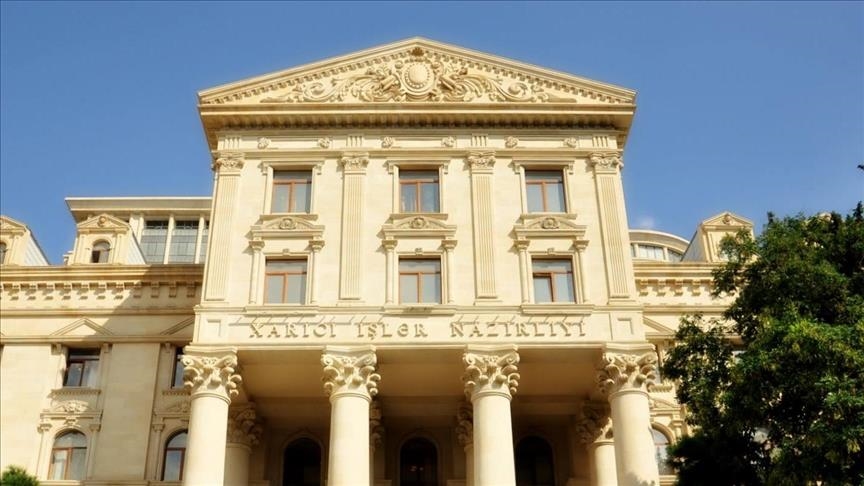

By Anadolu Agency
ANKARA
Armenia accusing Azerbaijan of violating the fall 2020 agreement ending the 44-day Karabakh War is “nothing but mere hypocrisy,” Azerbaijan’s Foreign Ministry said on Thursday.
Azerbaijan has repeatedly pointed to Armenia’s failure to meet the provisions of the Nov. 10, 2020 agreement signed by the two nations plus Russia, and especially how Armenian armed groups have not yet pulled out of Azerbaijan territories in Karabakh, said a ministry statement.
The ministry said under the tripartite agreement, “the peacekeeping contingent of the Russian Federation is deployed (in Karabakh) in parallel with the withdrawal of the Armenian armed forces.”


In addition to ample evidence of the presence of illegal Armenian armed forces on the territory of Azerbaijan, this fact has also been acknowledged by Armenian officials, it said.
“We emphasize that the reason for the recent tension is the presence of illegal Armenian armed troops in the territories of Azerbaijan and provocations instigated by them. The bloody incident and killing of an Azerbaijani soldier on August 3 is precisely the result of Armenia’s failure to fulfill its obligations,” the statement read, referring to an incident on Wednesday.
Pointing to the months-long ongoing construction of a new road along the Lachin corridor – a mountain road connecting Azerbaijan to its territories in Karabakh – the ministry said the Armenian side is sufficiently informed about this project.
The ministry underlined that if the Armenian side aims to delay implementation of this obligation, as well as other provisions of the tripartite agreement, with various pretexts, this is yet another demonstration of “Armenia’s non-constructive and disruptive activity vis-a-vis its obligations stipulated in the trilateral statements and other agreements.”
It stressed that full implementation of the tripartite agreement is essential for ensuring peace and stability in the region, as well as post-conflict normalization.
“Azerbaijan remains committed and fully fulfills its obligations and strongly demands that Armenia also adhere to these commitments,” the ministry said.
3-decade occupation
The ministry also brought up nearly three-decade occupation of Azerbaijan’s Karabakh (then known as Nagorno-Karabakh) by Armenia, which was due to end under the pact ending the fall 2020 Karabakh War.
“Contrary to accusations of ‘aggressive activity’ by Azerbaijan, we remind the Armenian Foreign Ministry that it is Armenia whose military units occupied the territories of the neighboring states for nearly 30 years, and which have not withdrawn their illegal armed groups from the territories of Azerbaijan after the end of the occupation policy. Azerbaijan ensures the security and integrity of its territory on legal grounds,” it concluded.
Azerbaijan said it launched a retaliatory operation Wednesday against Armenian forces in Karabakh after Armenia opened fire and killed an Azerbaijani soldier, according to a Defense Ministry statement.
The ministry said Azerbaijan “took relevant measures” and launched a counter operation after Armenian forces tried to seize Girkhgiz hill and establish new combat positions.
“As a result of the ‘revenge’ retaliatory measure carried out by Azerbaijani Army Units, the Girkhgiz peak, as well as Saribaba along the Karabakh ridge of the Lesser Caucasus and a number of other important heights, were taken under control,” it added.
Separately, the ministry on Thursday reported “full control over the operational situation” in the region.
Relations between the former Soviet republics of Armenia and Azerbaijan have been tense since 1991, when the Armenian military occupied Nagorno-Karabakh (Upper Karabakh), a territory internationally recognized as part of Azerbaijan, and seven adjacent regions.
During the conflict in fall 2020, Azerbaijan liberated several cities and nearly 300 settlements and villages that had been occupied by Armenia for nearly three decades.
A Russian-brokered deal in November 2020 brought an end to the conflict.
We use cookies on our website to give you a better experience, improve performance, and for analytics. For more information, please see our Cookie Policy By clicking “Accept” you agree to our use of cookies.
Read More